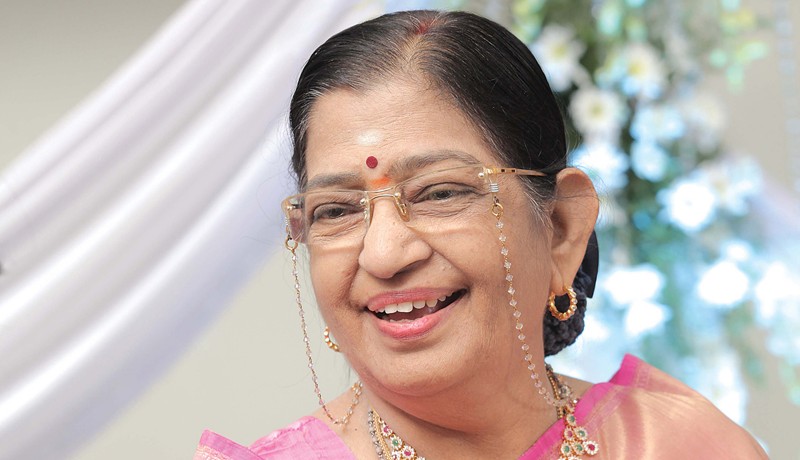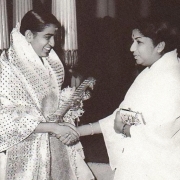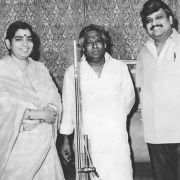
People

Eternal songstress P Susheela shares her musical journey with Saritha Rao Rayachoti.
If you happened to live in Southern India in the 1960s and ’70s, your favourite soundtrack would undoubtedly carry the mellifluous voice of P Susheela. There’s a ‘Susheela song’ for every emotional nuance—from the coy admission of love to a mother’s wistful lullaby, from haunting lament to fervent devotion, from the undertones of desire to indulging in whimsical wordplay. And every generation has its favourites. After all, she has been singing for over six decades!
Bursting onto the playback music scene at the tender age of 16, Susheela stole the hearts of fans, music composers and directors in the Southern Indian film industry with her crystal clear voice, intricate modulation and flawless intonation. In the 1950s, vocalists like P Leela, M L Vasanthakumari and Jikki ruled the film music industry with their distinct styles and ability to sing in more than one southern language. Susheela went on to dominate the field in the decades to come, not merely on the basis of her voice, her mastery over language and musical style but her adaptability to the changing tastes of the audience and insight into the working personalities of different music composers.
Susheela has been conferred some of the most prestigious accolades in the country, including the Padma Bhushan, five National Awards, over 10 state awards and numerous titles. At the age of 80 today, Susheela is still making waves. She was recently recognised by Guinness World Records for rendering the greatest number of songs in Indian languages. Although this eternal songstress has many monikers—Melody Queen, Nightingale and Gaana Saraswathi—none of them quite conveys her ability to tug at your heartstrings when she starts to sing.
The early years
Susheela was drawn to singing from an early age. The musical climate at home allowed her interest to blossom and she began training in classical music. “I can recall constantly singing some song or the other while at home and passing on tasks or errands entrusted to me by mother to my unsuspecting younger sisters,” she reminisces. “My father could play the veena very well. He wanted me to sing classical Carnatic music like the much-respected Smt M S Subbalakshmi.”
While it is commonly believed that Susheela’s first recording was a duet with A M Rajah for the movie Kanna Talli (Telugu)/Petra Thaai (Tamil) in 1952, Susheela recalls it being her second song from the same movie. “The first song in this movie was the Gajendra moksham padhyam,” she says, “The recording was over in a jiffy and I remember the composer Sri Pendyala Nageswara Rao being mighty pleased with the end result.”
A career in melody
“Playback singing is all about making your singing suit a beautiful heroine or a handsome hero, as the case may be, without diluting musicality,” she says. “That can be tricky, at times, while handling intense phrases with lots of gamaka, as one needs to put them through without a hint of classicism and yet without losing an iota of musicality.”
The phrase ‘prodigious talent’ does not quite encompass the intense training that Susheela underwent in the early years. “It called for singing over all the instruments, which was tough,” she recalls. “If there was one mistake by any one, the entire process had to be restarted. Time went into positioning the musicians behind the microphones so the volume would be at the desired levels. An orchestra-heavy or typical classical number stretching to 10 minutes with many percussion instruments, chorus singers and various instruments took a long time to rehearse, as each section would need to be verified by the composer.”
Over the years, Susheela developed a working rapport with stalwarts such as S Rajeswara Rao, Viswanathan-Ramamurthy, A M Raja, T M Soundararajan, P B Sreenivas, Ghantasala, K V Mahadevan, Ilaiyaraja, S P Balasubrahmanyam (SPB) and K J Yesudas. She’s has sung for composers as varied as V Dakshinamurthy and A R Rahman.
“Each composer had his own preferences, which would need to be understood and imbibed for the eventual output to be in alignment with the composer’s taste,” she elaborates. “You encounter composers who keep incorporating changes into an already-taught tune, and endlessly so. There are certain composers who, while singing an already-taught phrasing or line, would sing it differently in the next instance and the singer would be in a quandary as to what actually should be taken up for singing. There have been cases where the film director has asked for the tune to be changed and this would be after all those gruelling rehearsals. Learning the song all over again, rehearsing and then singing would then need to be done from scratch.”
Having been witness to the sweeping changes in the music industry across decades, Susheela believes in one piece of early advice that has stood her in good stead. “The value that was automatically ingrained in me was to sing with clarity, keep in mind that every song veers towards a particular sentiment or a mix of sentiments, and bear that in mind while delivering phrases and words.”
Memorable moments
In Susheela’s early years, her defining influences were Hindi songs of the early 1940s and bhava geet or light music composed by S Rajeswara Rao. “I recall slapping a sari against the washing stone, to dry it, of course, while singing Tummeda oka sari, a bhava geet composed by Sri Rajeswara Rao. As the intensity increased, so did the force behind every slap on the stone. Eventually, there was very little to say about the state of the sari!” Little did she know back then that she would sing for S Rajeswara Rao one day!
Susheela recounts a humorous incident that occurred during a recording with M S Viswanathan (MSV). “A mouse managed to find its way into the recording room and on seeing it, I let out a squeal that shocked MSV. He came rushing in without a second thought and was very relieved when he realised that all the drama was something inane.”
While Susheela does not have a specific routine or diet to keep her voice in excellent shape, she ensures she does not talk too much before a recording. Few people are aware that some of her most popular songs were not rendered quite as effortlessly as one believes. “I have sung several songs with a bad throat—Athhaan ennathhaan and Raajaavin paarvai come to mind immediately.” And being the consummate professional she is, she never let a bad throat come in the way of a good recording.
Guinness record
In January 2016, Guinness World Records recognised Susheela’s prolific singing career—she has recorded an astounding 17,695 songs solo, duet as well as chorus-backed, in over six Indian languages since the 1960s. And this does not include songs she recorded in the 1950s and those in six additional languages!
“The process of compiling the list began with the launch of the website www.psusheela.org by a select group of my fans back in 2003,” she shares. “When they found the count could qualify me for a Guinness record, they initiated a three-year-long, arduous process where several emails were exchanged and tonnes of information captured, formulated and sent across for review by the Guinness people. This also involved my fans going through the title cards of each and every movie I have sung in!”
The number painstakingly compiled by her fans came as a surprise to Susheela herself. “I had no idea that I had sung so many songs, deploying the primitive technology prevalent in those days. The team of fans who worked on this tells me that this number is now bound to exceed 25,000. The record will need to be updated soon. The list of songs compiled by my fans took several years and the least I can do is thank them.”
Influences
Susheela counts many people as her influences. “My father, who encouraged me in my musical quest, my husband who ensured my focus was never off my career and the entire producer, director, music director, lyricist fraternity that helped me in my career.”
She is very grateful to her late husband Dr Mohan for his many sacrifices. “He was very, very particular that there should be no impediments in my career. He would not even allow me to cook. He would buy gramophone records of mine the moment they released; he listened to them and always had comments to offer.”
A day in the life
While Susheela’s son, Jeyakrishna, daughter-in-law Sandhya, and their younger daughter live with her in Chennai, their older daughter is studying in Bengaluru. Susheela is a private person but when she isn’t recording or travelling, the highlight of a typical day is time spent with her fans. “In the evenings, some of my special fans step in, playing some rare songs of mine to me, especially from our Facebook page. Some of my colleagues also keep coming to visit me.”
Technology does not faze the 80 year-old; she uses it effortlessly. “I am pretty comfortable with touchscreens. I do a lot of surfing, watching movies and listening to rare music online on my tab. The moment a new device finds its way to me, I do not look up until I have a handle on it.”
Susheela is also very spiritual and spends a lot of time in prayer and quiet contemplation. “To me, spirituality is happiness realised,” she says. “Readily smiling and following my heart help me remain fresh in my thoughts. I get drawn to temples and deities, which fill me with peace and joy.”
Giving back
Today, as a judge on television talent shows, Susheela comes across children embarking on a career in music. “They are tremendously talented, with voice trainers to guide them. If great compositions come their way, they are bound to go places.” Her advice to them is timeless and simple: “Remain humble and learn every new song as if it were your first.”
Susheela also started a trust in 2008 to address the needs of financially disadvantaged musicians—several instrumentalists, past singers, chorus singers and composers are recipients of the monthly pension scheme her trust offers. “The trust has also made spot payments on several occasions where the need for funds has been urgent and towards hospital bills for treatment of serious ailments.” While Susheela is unable to divulge too many details about her upcoming projects, her music, like her, seems to be drawn towards the spiritual. She says, “There are a few albums in the offing, all of them devotionals.”
Abiding principles
Susheela attributes her serenity to her attitude to life. “Letting go of the past and accepting the present goes a long way towards removing stress.” On a parting note, she adds, “The most important thing in life is to be unconditionally happy. Happiness emerges when we let go of what is holding us back, like dwelling on the past, living in past glory, harbouring prejudices and worrying about the morrow.”
Milestones
1969
National Award for Paal polave/, Uyarndha Manidhan (Tamil)
1978
National Award for Jhummandi naadham, Siri Siri Muvva (Telugu)
2008
Padma Bhushan Award
2016
Guinness Book of Records recognition for singing the most (17, 695) solo, duet and chorus-backed songs in six Indian languages
2016
Asia Book of Records has recognised her for having recorded the most (18,330) solo, duet and chorus-backed songs in 12 Indian languages
Pic courtesy: P Susheela, www.psusheela.org Featured in Harmony — Celebrate Age Magazine July 2016
you may also like to read
-
For the love of Sanskrit
During her 60s, if you had told Sushila A that she would be securing a doctorate in Sanskrit in the….
-
Style sensation
Meet Instagram star Moon Lin Cocking a snook at ageism, this nonagenarian Taiwanese woman is slaying street fashion like….
-
Beauty and her beast
Meet Instagram star Linda Rodin Most beauty and style influencers on Instagram hope to launch their beauty line someday…..
-
Cooking up a storm!
Meet Instagram star Shanthi Ramachandran In today’s web-fuelled world, you can now get recipes for your favourite dishes at….









